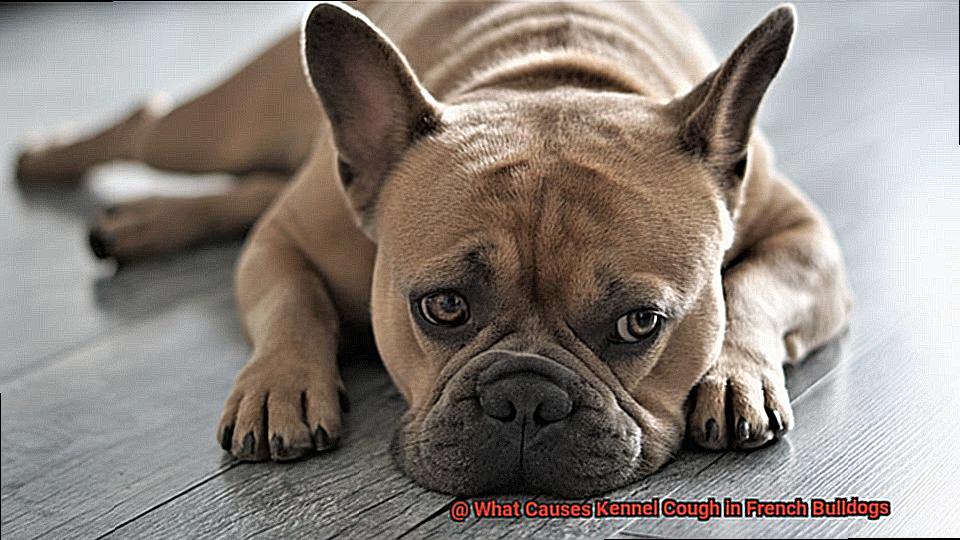What Causes Kennel Cough in French Bulldogs?
As a French Bulldog owner, you know that keeping your pup healthy and happy is your top priority. But what exactly is kennel cough? And, more importantly, what causes it in French Bulldogs?
Kennel cough is an infectious respiratory disease caused by a variety of viruses or bacteria. The most common cause of kennel cough in French Bulldogs is Bordetella bronchiseptica, a bacterium found in many dog’s respiratory tracts.
This bacterium can spread quickly through contact with other dogs at dog parks and boarding facilities.
But there are other potential causes too. For example, overcrowded shelters and poorly ventilated areas can contribute to this condition. Air pollution from nearby factories or traffic can also irritate the respiratory system, making them more vulnerable to infections.
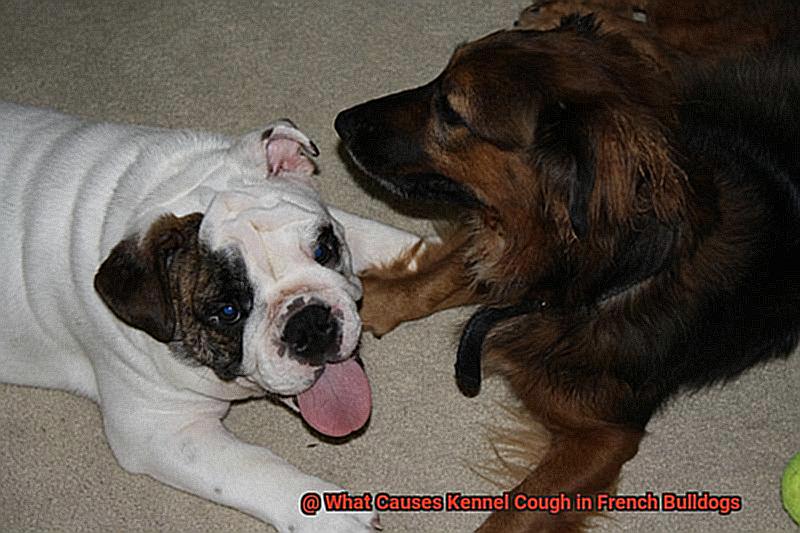
Lastly, poor diet or exposure to secondhand smoke can weaken their immune systems and make them more susceptible to acquiring the virus or bacteria that cause kennel cough.
Fortunately, there are steps you can take to minimize your pup’s risk of getting kennel cough.
I’ll be discussing these tips in my next blog post – so stay tuned!
What Causes Kennel Cough in French Bulldogs?
Contents
- 1 What Causes Kennel Cough in French Bulldogs?
- 2 Transmission of Kennel Cough in French Bulldogs
- 3 How Does Kennel Cough Manifest in French Bulldogs?
- 4 What Is the Best Treatment for Kennel Cough in French Bulldogs?
- 5 Can Kennel Cough Be Transmitted to Humans?
- 6 Risk Factors for Developing Kennel Cough in French Bulldogs
- 7 Prevention Tips for Keeping Your French Bulldog Healthy and Free from Kennel Cough
- 8 Common Myths About Kennel Cough and French Bulldogs
- 9 Conclusion
Kennel cough is a highly contagious respiratory virus that can affect French Bulldogs, as well as other breeds of dog. It is caused by a combination of bacteria and viruses, such as Bordetella bronchiseptica, Canine Parainfluenza Virus and Canine Adenovirus Type 2. Other less common causes include canine distemper virus, Mycoplasma species, and reovirus. Symptoms of kennel cough in French Bulldogs include a dry hacking cough, sneezing, nasal discharge, lethargy, and loss of appetite.
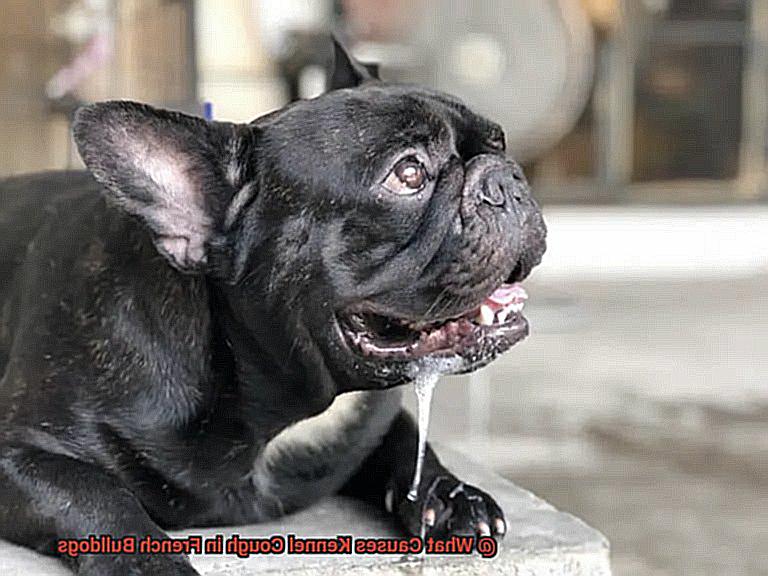
The virus spreads through direct contact with an infected dog or through contact with contaminated objects such as toys, bedding, and water bowls. It can also be transmitted through the air in enclosed spaces such as kennels or grooming salons. If your French Bulldog contracts kennel cough, treatment usually involves antibiotics to reduce the severity of the infection and supportive care such as rest and fluids.
Vaccination is the best way to protect your French Bulldog from this disease. Make sure they’re up to date with their vaccinations to ensure their health and safety.
Transmission of Kennel Cough in French Bulldogs
You should be aware of the risks of kennel cough. Kennel cough is an incredibly contagious respiratory infection that can spread rapidly among dogs – and unfortunately, French Bulldogs are particularly vulnerable due to their short muzzles and narrow tracheas.
The virus can be transmitted through direct contact with an infected dog, through the air, or even by contaminated objects such as food bowls and toys. This means that it’s essential for French bulldog owners to take steps to protect their pup from this potentially dangerous disease.
Vaccinations are the best way to safeguard your French bulldog against kennel cough; however, even vaccinated dogs can still contract the virus if they come into contact with an infected dog.
How Does Kennel Cough Manifest in French Bulldogs?
French bulldogs are particularly vulnerable to kennel cough due to their short muzzles and head shape. This highly contagious respiratory infection can manifest itself in a number of ways, including dry hacking coughs, sneezing, runny noses, and watery eyes.
Left untreated, kennel cough can become more serious and lead to pneumonia or other complications.
It’s essential for owners of French bulldogs to take preventive measures in order to protect their furry friends from this disease.
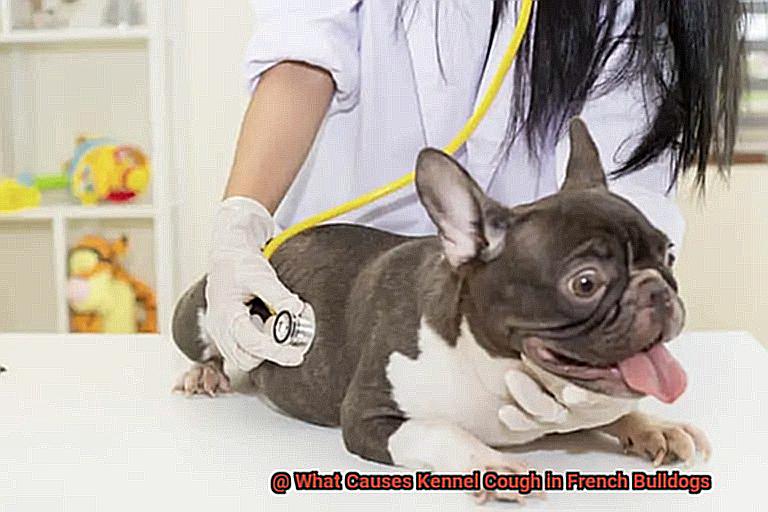
Kennel cough can be spread through direct contact or through the air, so it’s important to keep your pup away from other dogs that may have been exposed.
Additionally, make sure your dog is up-to-date on its vaccinations and bring them in for regular checkups with the vet.
What Is the Best Treatment for Kennel Cough in French Bulldogs?
If your French Bulldog is suffering from kennel cough, you may be wondering what the best treatment options are. Fortunately, there are several medications available to help get your pup back on the road to recovery.
Antibiotics and/or cough suppressants are generally prescribed for kennel cough in French Bulldogs. Antibiotics treat bacterial infections, while cough suppressants can reduce the severity of coughing fits. In some cases, an anti-inflammatory medication may also be prescribed to reduce inflammation in the airways.
It’s important to remember that antibiotics should only be used when absolutely necessary, as overuse can lead to antibiotic resistance and other health problems. Additionally, make sure your French Bulldog stays hydrated and gets plenty of rest while undergoing treatment.
If your furry friend has been diagnosed with kennel cough, talk to your veterinarian about the best treatment options for them.
Can Kennel Cough Be Transmitted to Humans?
Then you may have heard of “kennel cough,” a highly contagious respiratory infection caused by Bordetella bronchiseptica bacteria and other viruses. But did you know that it can actually be transmitted to humans?
Symptoms in humans include coughing, sneezing, runny nose, and fever. However, the good news is that kennel cough is not serious and usually resolves itself without treatment.
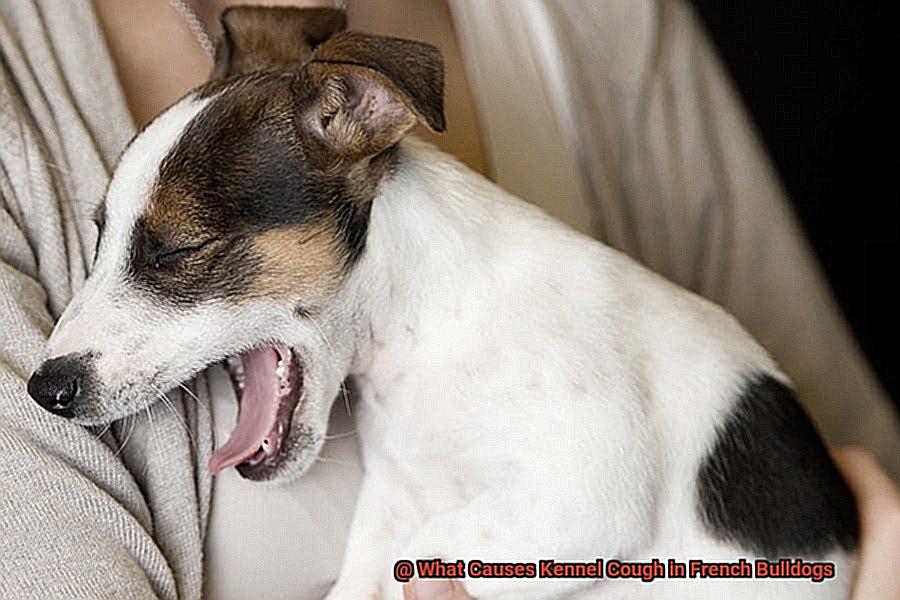
To prevent the spread of kennel cough from dogs to humans, practice good hygiene, such as washing hands after handling animals and avoiding contact with sick animals.
Risk Factors for Developing Kennel Cough in French Bulldogs
French Bulldogs are undeniably adorable, but they can be susceptible to kennel cough, which can be fatal. Kennel cough is a common respiratory disease that manifests as a dry cough, nasal discharge, and fever. To keep your French Bulldog healthy and happy, it’s important to understand the risk factors associated with kennel cough.
Crowding or inadequate ventilation in their living environment is one of the main risk factors for kennel cough in French Bulldogs.
This can create a breeding ground for bacteria and viruses, which can cause kennel cough. Poor hygiene habits, such as not cleaning the house regularly or not disinfecting it after a dog has been sick, can also increase the risk of kennel cough.
French Bulldogs with weakened immune systems are more likely to develop kennel cough due to their compromised immune systems.
Stressful situations like changes in climate or routine, long periods of confinement, or exposure to loud noises or unfamiliar people or animals can also raise the risk of kennel cough in French Bulldogs.
You can protect your beloved Frenchie from kennel cough by being mindful of these risk factors and taking steps to reduce them.
Make sure your pup has a safe living environment with good ventilation and follows proper hygiene practices such as regular cleaning and disinfection.
Additionally, try to limit stressful situations for your pup as much as possible.
Prevention Tips for Keeping Your French Bulldog Healthy and Free from Kennel Cough
If you have a French Bulldog, it is essential to take the necessary steps to prevent them from getting kennel cough. Vaccinations are the most effective way to protect your pup from this highly contagious respiratory disease, so make sure their vaccinations are up to date. Additionally, avoid exposing them to other dogs that may be infected with kennel cough, such as at dog parks or boarding facilities.
Good hygiene and sanitation practices are also key in preventing kennel cough in French Bulldogs. Make sure to regularly bathe and brush your pet, trim their nails, clean their teeth, and wash your hands after contact. Additionally, clean and disinfect areas where your French Bulldog spends time on a regular basis, such as crates, beds, and toys.
Monitoring your pet’s health is also important for avoiding kennel cough. Pay attention to any changes in behavior or wellbeing of your French Bulldog, such as coughing, sneezing, or difficulty breathing. If you notice any of these signs, take them to the vet immediately for diagnosis and treatment.
Giving your French Bulldog a supplement that contains immune-boosting ingredients such as omega-3 fatty acids and probiotics can also help ward off kennel cough. In addition, regular exercise for your French Bulldog will help maintain a healthy immune system, which will assist in preventing the disease.
Common Myths About Kennel Cough and French Bulldogs
Kennel cough is a highly contagious respiratory disease that affects not only dogs but cats and other animals as well. When it comes to French Bulldogs, it’s important to be aware of the common myths surrounding kennel cough and the truth about this disease.
One myth that needs to be debunked is that kennel cough cannot be transmitted to humans. This couldn’t be further from the truth; in fact, kennel cough can easily spread from an infected dog to humans through close contact.
Another myth regarding kennel cough is that vaccines are ineffective against this disease. While vaccines can help prevent the spread of kennel cough, they may not always be successful in preventing the disease itself.
Contrary to popular belief, kennel cough isn’t exclusive to dogs; cats and other animals can also contract this infection. Furthermore, despite their short muzzles and flat faces, which make them more susceptible to respiratory infections, French Bulldogs are no more susceptible to kennel cough than other breeds.
It’s essential for pet owners to understand the facts about kennel cough and French Bulldogs in order to protect their animals from this potentially serious illness.
Vaccinating your pet is one of the best ways you can do just that, so don’t hesitate to speak with your veterinarian about what kind of vaccine would work best for your furry friend.
Also Read: Why Do French Bulldogs Snort?
Conclusion
Kennel cough is a potentially lethal respiratory disease that French Bulldogs, with their short muzzles and narrow tracheas, are especially vulnerable to.
The most common cause of kennel cough in Frenchies is Bordetella bronchiseptica, a bacterium that lives in many dogs’ respiratory tracts. Contributing factors can include overcrowded shelters, air pollution, a poor diet, and secondhand smoke.
Fortunately, there are ways to protect your dog from this disease. Vaccination is the best defense; however, even vaccinated dogs may contract the virus if exposed to an infected dog.
Additionally, washing hands after handling animals and avoiding contact with sick animals are also important steps for prevention.
Be sure to keep an eye on your pup’s health for any signs of kennel cough—coughing or difficulty breathing—and bring them in for regular checkups at the vet’s office.
